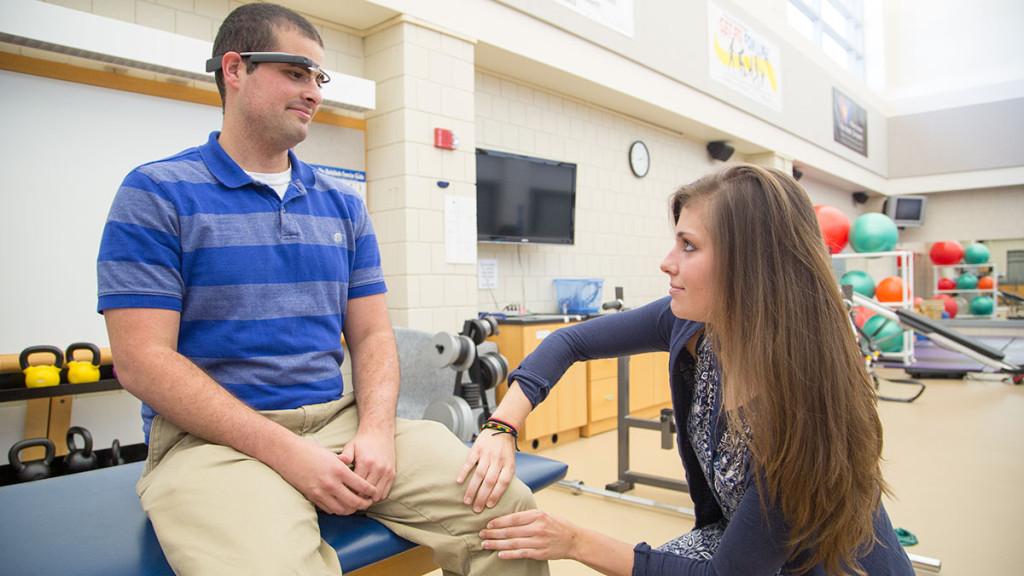Ithaca College faculty have owned Google Glass for no longer than a year and have already begun using it for major advances in education and health. Both the Roy H. Park School of Communications and the School of Health Sciences and Human Performance are working on new uses for Google Glass within the classroom, as well as outside of the college.
Bryan Roberts, associate dean of the Roy H. Park School, said he first discovered Google Glass through his friend Sjoerd Gehring, global head of talent sourcing and innovation at Accenture, a company that develops and implements new technology to improve other organizations. When Gehring introduced Google Glass to Roberts, Accenture had been using Google Glass in surgery.
Roberts said until this year, consumers could not purchase Google Glass. They could only be invited to be a Glass Explorer. Glass Explorers are people who purchase Google Glass and become part of the beta testers, according to a Google Glass representative. After experimenting with the product, Roberts said he pursued his interest in wearable technology and provided seven pairs of Google Glass for other members of the Park School, as well as Michael Buck, clinical associate professor in the Department of Physical Therapy.
“Wearable tech is what we’re interested in, and it’s just manifested itself through Google Glass, but technology is what you make of it,” Roberts said.
Roberts said the college is working with a private company to make these purchases affordable, all of which were paid for with private dollars.
Anthony Adornato, assistant professor of journalism, taught a class last spring called Mobile and Social Media Journalism, which incorporated Google Glass by having students discuss different ways journalists could use it. He said his students worked in groups, each with a chance to work with Google Glass, to come up with these ideas, which they then sent out in a poll through social media and analyzed the results.
“With new technologies, they need to be able to say ‘how can we use these,’ ‘how can we tool around with these?’ And, perhaps, create content and tell stories and reach the audience in new ways,” he said.
In addition to the communications school, the physical therapy department has also been working on incorporating Google Glass into classrooms.
Junior Alex Blackman, physical therapy major, worked in Buck’s class when he started using Google Glass. Blackman said he and junior Fiona Mancuso are now using it for a research project to record students’ interactions with patients.
“We are trying to see if viewing the interaction from this perspective adds more or better potential for students to see how they interact and how their interaction can be improved,” he said.
Buck said physical therapy students will also be able to use Google Glass to view video feeds from the new cadaver lab to the classroom, watch therapeutic technique demonstrations on a large screen in class and view video feeds from hospitals and clinics.
Roberts said he and Buck are in the midst of working with other professors at the college, colleagues at Cornell University and an institution in Florida to use Google Glass to help the elderly. Roberts said he is unable to disclose the techniques the group is using, but he said the goal is to help keep the elderly from falling.
Adornato said he received funding for Google Glass from the Park School dean’s office. He said the school makes available the tools necessary for educating the communications students.
“I think the Park school and the dean recognize that in order for us to be doing our job in educating future journalists and other communications professionals, we need to have these tools in the school,” he said. “We need to be integrating it into our coursework. We need to be allowing students to tool around with them.”
Roberts said he is focused on making sure Park School students have these tools available if needed. He said he is not as concerned with how students and teachers are using the tools, just that they are available.
“I look at my role as a dean as just creating a structure for people to succeed, and so I wouldn’t want to dictate the way they use it, but I want to make sure it’s available if wearable tech is where a student or faculty member would want to go for teaching or learning,” he said.
Buck said the use of Google Glass has not yet been perfected on the college’s campus. Even if it successfully connects to a cellphone that has a wireless connection, it still cannot project onto a screen. Buck said he would rather focus on using the new technology instead of worrying about the wireless connection.
“It would be wonderful to spend less time working around the current limitations of the campus network and more time exploring the use of technology to enhance teaching and learning,” he said.








